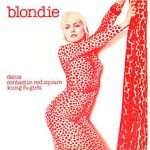Googling ‘Jim O’Neill’ and ‘Today FM’ brought a surprise. The man to whom I turn every Sunday lunchtime for a selection of happy memories presents his ‘Classic Gold’ programme not from Marconi House, the aptly named premises of the station in Dublin, but from Port Elizabeth in South Africa; such is the power of technology.
Jim O’Neill’s presentation style is a fascinating mix of traditional, straightforward DJ, of the sort that would once have sat at the mike at Radio Luxembourg, and a much more contemporary style of reflection and questioning. There was a pure pop moment on Sunday when he played Blondie’s 1977 hit ‘Denis’ (with the lovely Debbie Harry sounding so sophisticated and alluring as she sang the lyrics in French). O’Neill followed it with a question, ‘where are the Blondies now?’ He explained that watching the MTV Awards he had seen plenty of rap and dance music, that depended on lots of production, and no bands like Blondie who could write songs and play them.
Isn’t the cause of the phenomenon O’Neill identifies a fragmentation of the media and a fragmentation of culture?
In the days when Debbie Harry was assuming Gallic airs, the outlets for music were limited. In Britain in 1977 independent radio was in its infancy; even London had only a couple of stations. To get airtime it was necessary to produce songs that would appeal to a wide listenership; you would not make playlists unless you produced ‘commercial’ music. Certainly, there were bands who refused to compromise their identity, and who survived with a hard core of dedicated album buyers, but if you were going to be successful in terms of sales and radio play, then you had to be mainstream.
A homogeneous culture mostly produced homogeneous bands, who sold millions of records, and who can command airtime thirty or forty years after their recording was released, because there is a large constituency who listened at the time and who are still prepared to listen.
The fragmentation began with the multiplication of the number of radio stations, allowing or, perhaps, forcing stations to cultivate niche markets; it was compounded by the advent of satellite broadcasting, which brought dozens more channels; and was completed by the Internet, which allows you to play more or less any song by more or less any artist at more or less any time. If you wanted to play Debbie Harry singing ‘Denis’ twenty four hours a day, then the option would be available – go to YouTube and a number of options are available.
Fragmentation is a good thing, it allows a choice, it allows us to decide what we want to hear. Unfortunately, it also means that in twenty years time there will probably be no space for programmes like Jim O’Neill’s ‘Classic Gold’. There will not be sufficient listeners who remember the same songs; which will be sad, because when I am 70, I would like still to be listening to broadcasters who evoke happy times. The technological progress that allow Jim O’Neill to present his programme from Port Elizabeth is technological progress that will probably ensure the days of such programmes are numbered.

